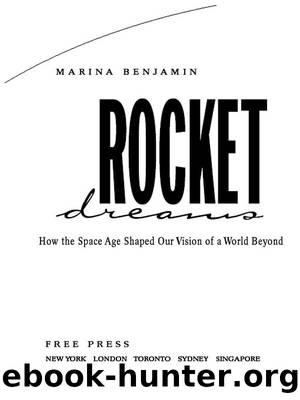Rocket Dreams by Benjamin Marina;

Author:Benjamin, Marina; [Benjamin, Marina;]
Language: eng
Format: epub
Publisher: Free Press
Published: 2003-11-14T23:00:00+00:00
âHere I sit in a patched-up mobile home on a lushly green field (mostly mesquite, Johnson grass and croton) at the end of a dirt road on the rural outskirts of a small town in Texas. A thick, forested fringe of cedar, oak and pine starts a hundred yards away to the east and north. A ranch with grazing cattle stretches to the west. My main companion is Ishi, the sole survivor of a small flock of guinea fowl I bought as chicks during the summer.â These words come from the journal of Richard Crews, a modern-day Crusoe who has elected to maroon himself (more or less) on a twenty-acre plot of land outside Bastrop, Texas, there to undertake a grand experiment in self-sufficient living. The experiment was supposed to be collective, but from May 2001, when Crews first moved onto the site, until November, he was the sole resident of his âecovillage.â This diary entry dates from September, by which time Crews had put in a flush toilet, water, electricity, even a phone. Heâd also acquired some solar panels, built a windmill on his roof, dabbled in hydroponics, and added gardening, composting, and recycling to his daily routine. It may not be much, but itâs Crewsâs first step toward paradise.
Crews, who has long been committed to what he calls âecological sanity,â does not believe that heâs abandoning the civilized world. Rather, he intends his efforts at creating a self-contained world to serve as an example to the rest of us as the only way that we might guarantee the very survival of civilization. While others are flocking to cyberspace to realize utopian dreams of community and explore what it means to build a âcivilizedâ world, Crews still believes in the down and dirty thatâs involved in building colonies for real. Heâs a genuine seventies throwback. But what distinguishes his Space Environment Ecovillage, or SEE-1, from a commune, say, is that far from being an end in itself, it is only the first phase of an ambitious scheme calculated to take mankind to the stars.
The mastermind behind the colonization scheme is Marshall T. Savage, an African American fine arts graduate who in the early nineties remodeled himself as a scientific visionary and hatched an eight-step plan for migrating into space. Crews is one of a few dozen people for whom reading Savageâs book, The Millennial Project, was a life-changing experience, and the SEE-1 colony over which he presides represents the projectâs modest beginningâa capsule world that aims to operate with complete autonomy. In time, SEE-2 and SEE-3 (to be built in progressively harsher and more isolated environments) will follow, before something to be called âAquarius Risingâ takes shape. This colony will be established on an isolated tropical shoreline site suitable for an ocean thermal energy plant and attendant âmaricultureâ facilities. âIt will require millions of dollars and a community of thousands of people,â says Crews, âand it will be a step toward a fully self-sustaining, floating ocean colony to be called Aquarius.
Download
This site does not store any files on its server. We only index and link to content provided by other sites. Please contact the content providers to delete copyright contents if any and email us, we'll remove relevant links or contents immediately.
The Vikings: Conquering England, France, and Ireland by Wernick Robert(84229)
Ali Pasha, Lion of Ioannina by Eugenia Russell & Eugenia Russell(40255)
The Conquerors (The Winning of America Series Book 3) by Eckert Allan W(37473)
The Vikings: Discoverers of a New World by Wernick Robert(36978)
Cecilia; Or, Memoirs of an Heiress — Volume 1 by Fanny Burney(32558)
Cecilia; Or, Memoirs of an Heiress — Volume 2 by Fanny Burney(31956)
Cecilia; Or, Memoirs of an Heiress — Volume 3 by Fanny Burney(31941)
Empire of the Sikhs by Patwant Singh(23085)
The Secret History by Donna Tartt(19088)
Hans Sturm: A Soldier's Odyssey on the Eastern Front by Gordon Williamson(18590)
Cat's cradle by Kurt Vonnegut(15353)
Pimp by Iceberg Slim(14506)
Sapiens: A Brief History of Humankind by Yuval Noah Harari(14389)
Talking to Strangers by Malcolm Gladwell(13370)
Norse Mythology by Gaiman Neil(13363)
Leonardo da Vinci by Walter Isaacson(13336)
4 3 2 1: A Novel by Paul Auster(12392)
Underground: A Human History of the Worlds Beneath Our Feet by Will Hunt(12097)
The Radium Girls by Kate Moore(12028)
